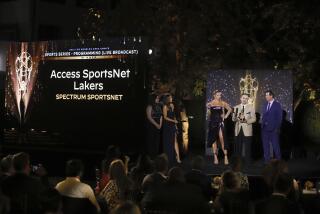Some O.C. Cable Customers Face Loss of KNBC, KTLA Broadcasts : Television: Channels 4 and 5 are scheduled to be yanked if local companies fail to win the right to carry signals.
- Share via
HUNTINGTON BEACH — Cable subscribers in Huntington Beach may miss out on “Cheers” reruns and the Channel 5 news beginning today. And Brea cable customers could lose “Seinfeld” and “The Tonight Show With Jay Leno.”
The companies that supply cable service to those cities had failed, as of late Tuesday, to reach agreements with KTLA and KNBC, respectively, to carry their broadcasts.
Without such agreements, the signals were set to be pulled from the air at one minute past midnight this morning.
In danger of losing KNBC (Channel 4) broadcasts as of press time last night were customers of Multivision Cable, which serves Anaheim; Century Cable, serving Brea and La Habra; and Comcast Cablevision, which serves Buena Park, Fullerton, Newport Beach, Placentia, Santa Ana and Seal Beach.
Those still negotiating with KTLA (Channel 5) were Multivision Cable and Paragon Cablesystems, which serves Garden Grove, Huntington Beach, Fountain Valley and Westminster.
Multivision was also still talking with the local Fox affiliate, KTTV, Channel 11.
“I’m sure, across the country, a lot of signals are going to go off,” said Leo Brennan, vice president and general manager of Dimension Cable Services, which serves Irvine, Newport Beach, most of South County and parts of northern San Diego County.
Affected cable customers will have to get those signals the old-fashioned way--by unhooking their cable. And that won’t likely sit well with customers who are paying an average of $25 to $40 a month for service.
The negotiations spring from a 1992 federal law that allows broadcasters to charge cable stations to retransmit their signals.
Most broadcasters have waived fees in return for cable companies adding new channels or one of their shows. Many Capital Cities/ABC customers, for example, will be adding its newest sports channel, ESPN2. Others have agreed to make room for KTLA’s Television Food Network, which debuts Nov. 23, in exchange for rights to air its programming for free.
CBS and Fox have agreed to extend negotiations for up to a year with many cable operators.
Some negotiations have been conducted in quiet boardrooms. Others have sparked firefights.
Bill Rosendahl, senior vice president of Century Southwest Cable Television, which serves 15,000 customers in Brea and La Habra, held the phone up to a “Donahue” broadcast Tuesday in his office. “Do you hear that?” he asked. KNBC has been urging consumers to call Century and complain or risk losing “Donahue.”
Last week, the network aired a similar plea in the middle of the popular Thursday night comedy “Seinfeld.”
People who are not even customers of Century Cable--even those who don’t receive cable service--have been calling, Rosendahl said.
KNBC’s “strategy is such that it is paralyzing my operation,” Rosendahl said. “Our phones are totally swamped.”
Rosendahl went on KTLA’s morning news broadcast Tuesday to vent his outrage.
KNBC’s general manager, Reed Manville, said that his company has offered Century Cable a deal that “has been accepted by the vast majority of cable companies.”
Where broadcasters and cable companies have reached agreements, viewers can expect some programming changes.
ESPN2 will move from Channel 53 to Channel 37 today in Tustin and Corona, for example. And Dimension Cable customers in South County will no longer receive the NBC and CBS affiliates that originate in San Diego, though they will retain the Los Angeles-based broadcasts.
Many of the changes will be worked out over the next several months, cable operators said. “We have the agreements, but they are still, literally, being written up,” said Jeff Davis, governmental affairs manager with Copley Colony Cablevision in Costa Mesa.
The Cable Act
A 1992 federal law allowing television networks to charge cable companies to carry their signals goes into effect today. Some basic sanctions that are being implemented:
* “Must carry” rule: Broadcast stations within a specific geographic area can demand that their programming be carried by cable operators if the programs are offered free.
* Retransmission fees: Broadcast stations may opt to charge cable operators a fee to ship their signals. These stations risk being dropped if the cable system refuses to pay.
* Consumer rights: Customers must be notified of any changes in rates, programming or channel positions at least 30 days in advance.
* Shop, don’t drop: Home shopping channels are included among broadcasters covered by the “must carry” rule. Home shopping networks formerly paid some cable operators for the transmission; now they need not pay.
* Extra costs: Additional fees charged by networks to cable companies may be passed on to consumers.
Source: Federal Communications Commission; Researched by ANNE MICHAUD / Los Angeles Times
More to Read
The biggest entertainment stories
Get our big stories about Hollywood, film, television, music, arts, culture and more right in your inbox as soon as they publish.
You may occasionally receive promotional content from the Los Angeles Times.










